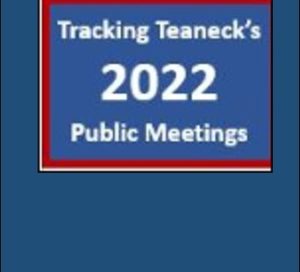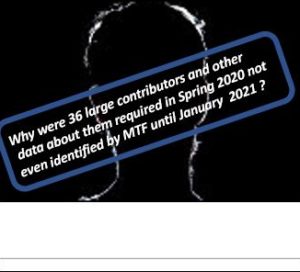Proof 2: Revenue Shortfalls from the Hotel Occupancy Fees
 In the final Quarter of 2018, 2 new high-rise hotels opened in Teaneck’s Glenpointe area and their projected hotel occupancy fees were added to occupancy fees from the Glenpointe Marriott. The staged opening of the nearby American Dream promised new markets for this already evolving visitor center. And the $640 K in occupancy fees the 2019 budget had projected were low. They had, in fact, come in $325 K higher in 2019 than was budgeted. Hence in the “Covid-19-innocent” world of late February 2020, the 2020 budget’s $900 K projected occupancy fee revenue number may have even seemed modest. The introduced 2020 budget anticipated that hotel occupancy fees would bring in $900,000 in 2020, up 71% from the budgeted $640,000 in 2019.
In the final Quarter of 2018, 2 new high-rise hotels opened in Teaneck’s Glenpointe area and their projected hotel occupancy fees were added to occupancy fees from the Glenpointe Marriott. The staged opening of the nearby American Dream promised new markets for this already evolving visitor center. And the $640 K in occupancy fees the 2019 budget had projected were low. They had, in fact, come in $325 K higher in 2019 than was budgeted. Hence in the “Covid-19-innocent” world of late February 2020, the 2020 budget’s $900 K projected occupancy fee revenue number may have even seemed modest. The introduced 2020 budget anticipated that hotel occupancy fees would bring in $900,000 in 2020, up 71% from the budgeted $640,000 in 2019.
The day after the Manager gave his 2/27 budget Power Point, New York area hotel occupancy percentages stood at 79.1%; by the following Friday they had plummeted to 18.3 % or to 17% by another analysis (https://www.politico.com/states/new-york/albany/story/2020/03/25/hotel-occupancy-rates-plummet-as-coronavirus-decimates-tourism-trade-1269006). For how long will this visitor travel freeze continue as NYC-NJ weathers being the epicenter of the coronavirus pandemic? Everything is in flux – per day hotel rates have collapsed as well.
 Is this occupancy debacle a one or two quarter phenomenon; could commerce recovery come by August or October. Maybe those who register in hotels will hunker down – but then, long-term stays at hotels are exempted from such taxes. So could Teaneck’s occupancy tax generate perhaps half of the budgeted target?
Is this occupancy debacle a one or two quarter phenomenon; could commerce recovery come by August or October. Maybe those who register in hotels will hunker down – but then, long-term stays at hotels are exempted from such taxes. So could Teaneck’s occupancy tax generate perhaps half of the budgeted target?
What is most noteworthy about this 2nd proof that Teaneck tax levels won’t be as promised is that in the one month between when the Manager’s budget was prepared and Council introduced it unchanged, the industry providing this vaunted new occupancy tax revenue source was decimated: “Stay at home” had become an edict not an idea or recommendation. Anyone who looked at projections for hotel occupancy fee revenues would have known it was wrong by half. Councilman Jim Dunleavy even said before he voted yes to introduce the un-examined budget: “it’s unlikely that will we be able to come up with an adequate or accurate set of revenues or expenses. It is just impossible because with all that has happened there is no solid ground”.
But the fact that revenues were going to shrivel and expenses explode was by March 24 obvious. Yet no one in Teaneck officialdom even hinted that in the interim before approving a budget it should st least specify the markers of where required change should be identified and gauged. That fundamental fiscal reassessment process – in which every other unit (family, public agency, etc.) in NJ has become – and continues to be – engaged was one which the Teaneck’s administration and Council should have acknowledged – and become fully involved – but said and did NOTHING. It is the captive of a failed slogan
It is as though the hotel occupancy tax “proof” is the canary in the coal mine. Its unrevised presence in the Township’s introduced budget tells us that a commitment other than responsible public service was in total control of: 1) what Council said and did at its meeting on 3/24 and 2) its wanting no April public or deliberative meeting and 3) its decision not to revisit the budget until 5/19 – after the election.
That mindless commitment to freezing the budget process at late February numbers has to have been driven by the “Zero budget” election slogan. What else can explain the desperate effort to NOT acknowledge that Teaneck taxpayers will NOT make it through 2020 with an unaltered, level budget. And so governance in this extraordinary town with its rich culture and democratic values has been led by its elected leaders now to worship above all the idol of a zero 2020 budget – a zero 2020 budget which now 1) can never be and over which 2) surely this Council’s work is compromised. Its zero-budget absorption shows it is cannot muster the leadership and decision-making skills needed to guide us though the very complex challenges this virus currently poses to the life, safety and well-being of this diverse community.




